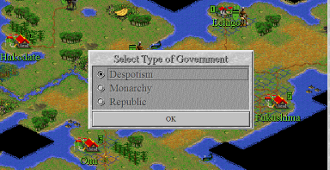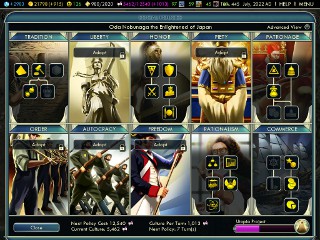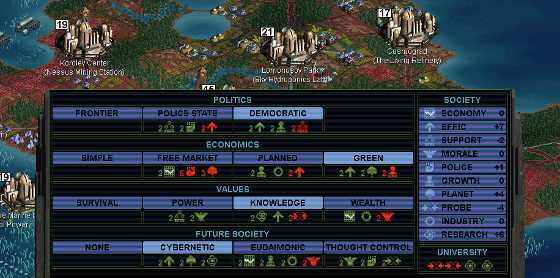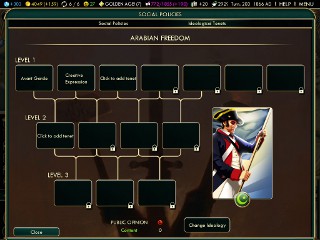Videogames are inextricably bound to ideology. In most cases, this is not by design, but simply because game developers tend to create virtual worlds that reflect the particular way in which they see the real world. As Ian Bogost (2006) has noted, these ideological frames are rarely explicit, making it all the more important that we critique them. But what about when game designers take ideology, as a concept, and turn it into a game mechanic?
This is the case in Brave New World, the most recent expansion to Civilization V. Focusing primarily on culture and diplomacy, Brave New World redesigns the Civ V social policies, adding a number of new policy trees and taking the final three, order, autocracy, and freedom, and reclassifying them as “ideologies.” As before, the three are mutually exclusive, though instead of the usual five policies, each ideology presents the player with 16 ideological tenets from which to choose.

While this is the first time that Civ has included a mechanic called “ideology,” the series has touched on the subject in different ways since its inception. Earlier games allowed the player to choose between different forms of government like monarchy, communism, and democracy. While these were certainly very simple abstractions, their procedural implementation makes for an interesting commentary on post-Cold War American views on the world. Some governments are more “advanced” than others, with democracy sitting atop the pile. Communism is aggressive and militaristic, with fundamentalist religious states being even more so. Perhaps significantly, democracy in early Civ games tends to be less about a government run by the people and more about capitalism. The main appeal of democracy in terms of gameplay is that it gives you flexible tax rates and tons of trade. In fact, the only mechanic that reflects a government of the people, the senate preventing the player from declaring war, is a definite disadvantage for the player – a problem to be worked around (either through espionage or by controlling the United Nations), rather than the core tenet of the democratic ideal.

In Civ V, as Emily has previously noted, the previous models of government were replaced by the various social policies trees. This allowed for a much more nuanced and customizable form of government (although as Emily points out, some previous options like slavery were removed). Unlike previous models, however, adding a new social policy is almost always a benefit with no strings attached. Rather than making conscious trade offs, such as sacrificing military flexibility for citizen happiness, the optimal strategy in Civ V is simply to accumulate as many social policies as you can. Having a culture with a republic is good, but having a culture with a republic, a monarchy, and a meritocracy is even better. In fact, the only negative effects you can incur by adopting a new policy is when you open a tree that is incompatible with another you have invested in, such as rationalism and piety. Brave New World makes few changes to this aspect of the system, aside from multiplying the number of potential bonuses associated with your final choice of ideology (although science and religion are no longer mutually exclusive). Although the social policy system is a far more interesting mechanic in most ways, it also presents a much less robust and less critical view of ideology. It is perfectly acceptable to have a culture that has supposedly embraced ideals such as universal suffrage, while still being run by an oligarchy, or create a socialist state that maintains the aristocracy and landed elite that have existed for thousands of years.
Of all Sid Meier’s grand strategy games, the one that I find presents the most interesting model of ideology is outside the Civilization franchise proper. Sid Meier’s Alpha Centauri, created just after Meier left MicroProse to co-found Firaxis, is different from the Civilization games not just in its extraterrestrial setting, but in its much darker, more cynical tone. Rather than the utopian premise of creating a perfect society that underlies most Civ games, Alpha Centauri is set after civilization on earth has collapsed and humanity’s last hope, a mission to colonize another world, has broken up into squabbling factions vying for power. Perhaps it is this more pessimistic tone that makes Alpha Centauri’s portrayal of ideology seem more realistic and human.

While each of the factions essentially represents a competing ideology, such as environmentalism, capitalism, or militarism, the player’s society is not set in stone upon choosing a faction. As the game progresses, the player is able to choose her faction’s ideological stance, via the “social engineering” screen, on a number of issues, including politics, economics, and the society’s vision of the future. Each of these choices has both advantages and disadvantages. For example, a free market economy boosts the production of wealth, but increases damage to the environment and creates unhappiness amongst the underclasses. A green economy is very efficient and protects the environment, but tends to restrict growth. Choosing certain policies also affects the player’s relationship with other factions. Choosing scientific knowledge as your society’s primary value, for example, will anger the religious faction, making peaceful relations more difficult and potentially igniting a war.

The most compelling aspects of Brave New World’s ideology system seem to build on the mechanics from Alpha Centauri’s social engineering. While there are still no inherent drawbacks for adopting an ideology or ideological tenet, competing ideologies now influence other nations in a similar, though much more complex way. Unlike other social policies, the player’s choice of ideology is subject to public opinion. If the people don’t like the ideology that is forced upon them, it creates unhappiness. If this discontent grows, it can eventually grow into a revolution and force the player to adopt a different ideology, even if that ideology is less than ideal for her long-term strategy. Public opinion is in turn influenced by the culture of other nations. If another nation with a differing ideology generates a large amount of tourism (the mechanical representation of cultural influence exported to other nations) in your country, the people will naturally begin to favor adopting such ideals themselves. Ideology also influences the way that diplomacy plays out in the world congress.
Although Brave New World may not address many of the aspects of ideology that seem to be somewhat lacking in the social policy model, it does make a number of new and interesting scenarios possible in Civ V. It is now possible for a game to involve the fall of communism (or democracy, for that manner), through societal pressure rather than war, allowing a more varied, and maybe even more authentic feeling, alternate history to emerge.
Also, for those who might be interested in comparing different Civ titles for themselves, the Humble Bundle has rather serendipitously launched the Humble Sid Meier Bundle today, which contains a number of different Civilization games, including Brave New World. And as always, Alpha Centauri can be found on GOG, free from pesky DRMs.
References
Ian Bogost, (2006). Videogames and Ideological Frames
